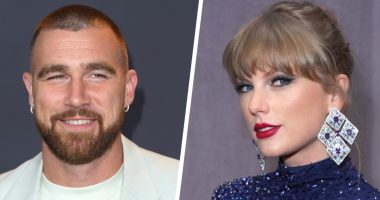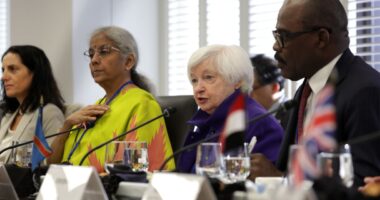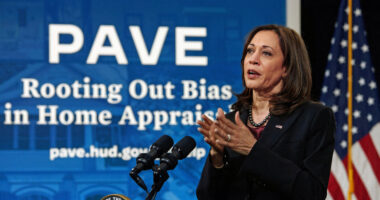Super Bowl advertisers are taking a cautious approach with their commercials, trying to hit the right tone on television’s most-watched night of the year amid a global pandemic, deep political divisions and movements for social justice.
While a handful of Super Bowl advertisers will use the stage to talk about their role in making the world a better place, and others’ commercials hint at some element of life during the pandemic, most are going for laughs and escapism.
Many Super Bowl advertisers are also using celebrities, a standard strategy no matter what is happening in the world. This year’s commercials show Amy Schumer selling Hellmann’s Mayonnaise; Michael B. Jordan embodying Alexa for Amazon.com Inc.; Maya Rudolph as four quarter-sized cowboys for buy-now, pay-later service Klarna Bank AB; a two-dimensional Matthew McConaughey pitching Doritos 3-D Crunch; and Post Malone and Cedric the Entertainer promoting Bud Light, alongside ad characters like the Bud Knight.
In addition to the Doritos ad, PepsiCo Inc.’s Frito-Lay is running a Cheetos ad that reprises Shaggy’s 2000 hit song “It Wasn’t Me” with Mila Kunis and Ashton Kutcher, and another multibrand commercial showing star Super Bowl players fighting over its snacks.
“When we looked at the Super Bowl and were trying to understand what consumers are looking for, it was this moment of joy and release,” said Rachel Ferdinando, senior vice president and chief marketing officer of Frito-Lay North America.
To be sure, not all advertisers are shying away from the tensions that defined this past year.
Jeep is running a somber two-minute ad starring Bruce Springsteen and acknowledging the division in the country. The last frame shows the outline of the U.S. with the phrase: “To the ReUnited States of America.”
“I’m not shooting for funny or serious. I don’t care,” said Olivier Francois, global chief marketing officer at Stellantis NV, parent company to brands including Jeep and Chrysler. “I’m shooting for a lasting message.”
Advertisers coughed up as much as $5.5 million for 30 seconds of airtime during this year’s matchup Sunday between the Tampa Bay Buccaneers and the Kansas City Chiefs, hoping to take advantage of one of the few remaining TV events that reaches a swath of consumers at once.
This year’s game is the culmination of a season pummeled by the coronavirus, which forced disruptions like the delay of a marquee game scheduled for Thanksgiving because of an outbreak on the Baltimore Ravens.
The game is still expected to blow other TV programming out of the water. Last year, it reached roughly 100 million viewers.
While attempts at humor have always dominated the Super Bowl ad roster, historically the commercials have encompassed a range of themes and tones, including serious and emotional approaches. This year, there appears to be much less variation, said Tim Calkins, a clinical professor of marketing at Northwestern University’s Kellogg School of Management.

Michael B. Jordan appears as a sultry Alexa voice assistant in a Super Bowl commercial from Amazon.
Photo: Amazon/Lucky Generals
“Advertisers are reflecting our behaviors and the life we’re leading, but only in the most positive way,” Prof. Calkins said.
“Some of the ads that ran on the Super Bowl last year would never run this year,” he added, citing a 2020 Super Bowl ad for Google that featured an older man who lost his wife, and New York Life’s emotional ad about love as an action.
Advertisers’ challenge this year was two-pronged: sell their products and philosophies to a nation on edge, but also stand out in a sea of feel-good ads, executives said.
“There’s more pressure this year,” said Eliza Yvette Esquivel, North America chief strategy officer at branding agency FutureBrand. “Human beings are fatigued by the onslaught of what’s happened to us over the last 12 months, and there have been very few united-eyeball moments where we’ve been provided any relief from that.”
Mountain Dew recruited actor John Cena for a playful Super Bowl ad promoting its Major Melon flavor.
“ ‘A tone-deaf brand is one that does not have empathy for what consumers are going through. We spent a lot of time on that.’ ”
“A tone-deaf brand is one that does not have empathy for what consumers are going through. We spent a lot of time on that,” said Greg Lyons, chief marketing officer of Mountain Dew parent PepsiCo Beverages North America. “Over the past few years, with racial inequality, with politics, it’s been harder to make sure you’re striking the right tone, and Covid just added to that.”
While most brands shied away from stories that were serious or overly emotional, some attempted to promote their social responsibility efforts while keeping the tone sunny.
General Motors Co. enlisted comedians Will Ferrell, Kenan Thompson and Awkwafina to deliver its promise of new electric vehicles; the trio sets out to warn Norway that America will crush its EV record.
Chipotle Mexican Grill Inc. features a boy talking about how a burrito can change the world, based on “how we plant things, water things and grow things…”
Chipotle had planned a campaign this year that raises awareness of its food standards and support for farmers, but initially hadn’t intended to buy a Super Bowl spot, said Chief Marketing Officer Chris Brandt.
When the chain’s ad agency, Venables Bell & Partners, showed him the spot, he changed his mind.
Awkwafina and Kenan Thompson in a General Motors ad in which Will Ferrell aims to ‘crush’ Norway’s per-capita dominance in electric vehicles.
Photo: Associated Press
“We spent a lot of time on the tone of this spot to make it right, not so serious and depressing, but a bit of optimism and talk about what we think about farming,” Mr. Brandt said. “It just felt like it was big enough, but still had a good lighthearted tone.”
A few ads refer to the pandemic, but in an oblique way. Bud Light Seltzer Lemonade, for instance, depicts 2020 as a relentless storm of lemons from the sky, wreaking havoc on everyone’s lives.
Other Super Bowl regulars are passing on a spot this year. Budweiser said it would redirect some of the money it would have spent on the Super Bowl to vaccine awareness efforts. Coca-Cola and Pepsi are also sitting it out, though Pepsi continues to sponsor the halftime show.
Newcomers to the event include Kimberly-Clark Corp.’s Huggies, Unilever PLC’s Hellmann’s and Bass Pro Shops and Cabela’s.
Some of the first-timers are coming off strong business performances despite the pandemic and its lockdowns, including lawn-care marketer Scotts Miracle-Gro Co. , online marketplace Mercari Inc., online auto retailer Vroom Inc., Klarna, freelance network Fiverr International Ltd. and rival online food-delivery services DoorDash Inc. and Uber Eats.
Most chose to keep the pandemic out of their ads, but not all. Scotts Miracle-Gro, for one, acknowledged in its ad that backyards have had “quite a year.”
Write to Alexandra Bruell at [email protected]
Copyright ©2020 Dow Jones & Company, Inc. All Rights Reserved. 87990cbe856818d5eddac44c7b1cdeb8


